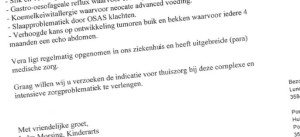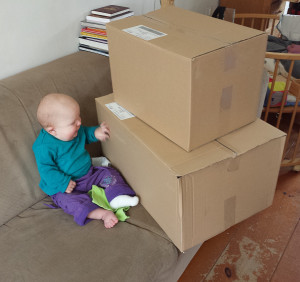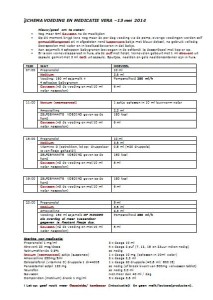At one time during Vera’s first year of life, we talked to a transfer nurse at the Wilhelmina Children’s Hospital. A transfer nurse makes sure that the transition from hospital to home runs smoothly. She listened to all that had been going on with Vera and said: “Vera is a care intensive child”.
Care intensive. That word made sense. It acknowledged what we were feeling, what it was and is like: intensive. And the intensive care and intensive life are making us tired. Sometimes extremely tired. We don’t want to complain or want pity. We have lots of beautiful moments with each other. But life is not the same as it was before Vera was born. We have worries, we have lots of medical appointments and we sleep very poorly. And that is ongoing. The interrupted nights in particular are taking their toll. Some nights are better, where we have to go to Vera 2 or 3 times because she is crying loudly. But there are nights on a regular basis where we care for her in the evening and have to go to her at night every hour or every half hour and then the next day starts early again. In times like that we are extra tired because we also worry, we are looking for the cause of Vera’s restlessness (it’s often not clear at all) and we are looking for solutions. And we are sad because we don’t want to see our child suffer. Thanks to the evaluation by the transfer nurse back then, in 2012, we were assigned hours of Children’s Home Care. During these hours a nurse comes to our house to take care of Vera so we can have a break. Fortunately, these wonderful people also work at night. Two, or in worse times, three times a week, we put Vera in her travel crib in the living room and the nurse sits next to her on the sofa. We get to sleep 7 or 8 wonderful uninterrupted hours in which we don’t have to be alert for sounds and we can have true deep sleep. (Luckily, Mieke doesn’t wake up at night very often). This keeps us going. To paint a picture: life with Vera is not a sprint, it’s a long distance marathon. A marathon in which the strengths have to be divided very precisely to be able to keep walking and not falter. And what else makes it so exhausting to take care of this sweet human being?
In the past couple of months we fortunately haven’t had any unexpected hospitalizations, but we did have lots of hospital visits and other medical appointments. We have to think about what we want to ask, know and do ahead of time. We have to plan what food and medication she needs (and because of the examinations: which ones are allowed) during those days, the trip there, the exams, consultations and treatments and whether this all is during school time or not and do we need to plan after school care for Mieke or not. And often after a hospital visit like that, we either have to call or make a trip to the pharmacy for new or different medication. Vera uses 4 different medical suppliers! If you ever need boxes, you can come get some at our house, see picture 😉 Which brings us to another issue: keeping track of all of Vera’s medication, which kind, how much, how to administer and at what time (because not everything can be given in combination or with food). And we also have to make sure to order new medicine from the right supplier before the current supply runs out. Every month there is a new schedule on the kitchen wall listing which medicine or food is needed every hour.
Some of the cost associated with Vera’s care can be declared with our tax authority, so we keep a list of number of hospital visits. When we take a look at all the numbers during 2013, we quickly remember why we are so tired so often and that doesn’t even include the lost sleep and worries we have. A couple of numbers:
- 101: number of medical appointments, not counting phone consultations or appointments
- 77 appointments were with the hospital or therapy outside the home, 24 were at home (physio, speech therapy)
- 39: number of nights Vera was hospitalized
- 2: number of times Vera was picked up at home by ambulance
- 1: number of times in the intensive care unit, this year ‘luckily’ only 2 days
- 1.825: number of syringes used for medication
- 4.963: number of kilometers travelled between hospital and home
And I could keep going. Because even the everyday things take more time and energy with Vera: taking care of her skin, preparing and giving her her food (by tube), (stimulating) communication and play etc.
But I think you get the idea and besides, I am going to relax for a bit because it is now quiet in the house…



